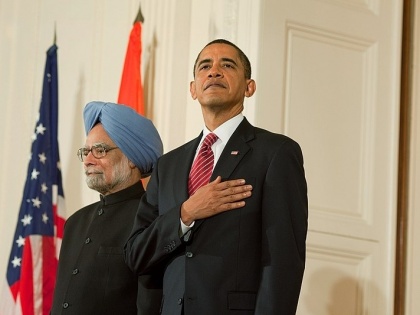How Manmohan Singh became Obama's first state guest
By IANS | Published: June 21, 2023 09:54 PM2023-06-21T21:54:02+5:302023-06-21T22:30:20+5:30
By Yashwant Raj Washington, June 21 Former Prime Minister Manmohan Singh was not then US President Barack Obama's ...

How Manmohan Singh became Obama's first state guest
By Yashwant Raj
Washington, June 21 Former Prime Minister Manmohan Singh was not then US President Barack Obama's first and automatic choice for his presidency's first state guest.
Singh became one by a "process of elimination", according to a former official of the Obama administration, who did not wish to be identified.
Singh was the last Indian Prime Minister hosted by a US President as a state guest until Prime Minister Narendra Modi, who will join President Joe Biden on Thursday. Incidentally, every other Indian Prime Pinister has had that honour with the exception of P.V. Narasimha Rao; some of them were honoured twice, including Indira Gandhi (1971, 1982) and Manmohan Singh (2005, 2009).
Here is how Singh got his second invitation as Obama's first state guest. The Obama White House had decided early that it wanted to do something different with the selection of its first state guest, and it had quickly dismissed the "usual suspects", the allies and neighbours such as the United Kingdom (Ronald Reagan's first), South Korea (Bill Clinton's first), and Mexico (George W. Bush's first).
It finally had a short-list of four: India, China, Turkey and Brazil. And then the process of elimination started, according to the former staffer.
China was an important and strategic candidate. President Obama was keen on improving relations with China and had seriously mulled a G-2 grouping, which was being pushed by some scholars as a way for the world's two largest economies to work together to fight the economic crisis and deal with geopolitical flashpoints around the world.
Obama had met then Chinese President Hu Jintao and Secretary of State Hillary Clinton had traveled to China in the early days of the administration.
But the Obama White House decided against Chin because "it did not want to honour a Communist country early on in the administration".
Turkey ruled itself out, according to the former staffer, because of "unhelpful moves" by then Prime Minister Tayyip Erdogan regarding Kurds, the country's largest ethnic minority.
The next candidate was Brazil, and the White House appeared to be "leaning heavily towards" it. Many staffers were convinced that it would be Brazil and President Luiz Inacio Lula da Silva, who is the current President as well.
But President Lula da Silva shot up his chances by eagerness to position himself for a larger global role by offering to mediate between the US and Iran. The "Obama people" did not like Lula telling them how to run US' ties with Iran — "there was a bit of hubris involved here".
India and Prime Minister Singh survived the elimination process, but they were not a top choice. Obama was not very keen at the time on a relationship with India.
As a Senator, Obama was one of the 13 Senators who had voted against ratifying the 2008 Civil Nuclear agreement signed by Prime Minister Singh and President George W. Bush.
Joe Biden, also a Senator then who would go on to be Obama's Vice President and then President, voted 'Yes' as did Hillary Clinton, who would go on to become Obama's Secretary of State and the Democratic nominee for President in 2016.
Senator Obama had also grilled then Secretary of State Condoleezza Rice during her testimony in 2006 on the Civil Nuclear deal.
But it was India which survived the "process of elimination" that was undertaken by the White House. And once the decision was made and announced, the administration went all-out to promote it and position it appropriately.
"President Obama will host Manmohan Singh, Prime Minister of India, at the White House on November 24 for an official state visit," the White House Press Secretary had said in a statement on October 2.
"This visit will be the first state visit of the administration and will highlight the strong and growing strategic partnership between the United States and India, and the friendship between the American and Indian people."
The Press Secretary had further said: "During the visit, the two leaders are expected to discuss a range of global, regional, and bilateral issues of shared interest and common concern. The two leaders will also likely discuss the strategic dialogue that was launched in July and review the progress made in the dialogue."
Singh's visit included a state dinner that was hosted by President Obama and First Lady Michelle Obama for the Indian Prime Minister and his wife Gursharan Kaur.
Disclaimer: This post has been auto-published from an agency feed without any modifications to the text and has not been reviewed by an editor
Open in app